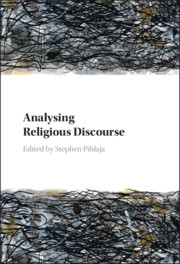3 results
20 - Conclusion
-
-
- Book:
- Analysing Religious Discourse
- Published online:
- 18 June 2021
- Print publication:
- 08 July 2021, pp 348-357
-
- Chapter
- Export citation
1 - Analysing Religious Discourse: Introduction
-
-
- Book:
- Analysing Religious Discourse
- Published online:
- 18 June 2021
- Print publication:
- 08 July 2021, pp 1-11
-
- Chapter
- Export citation

Analysing Religious Discourse
-
- Published online:
- 18 June 2021
- Print publication:
- 08 July 2021

